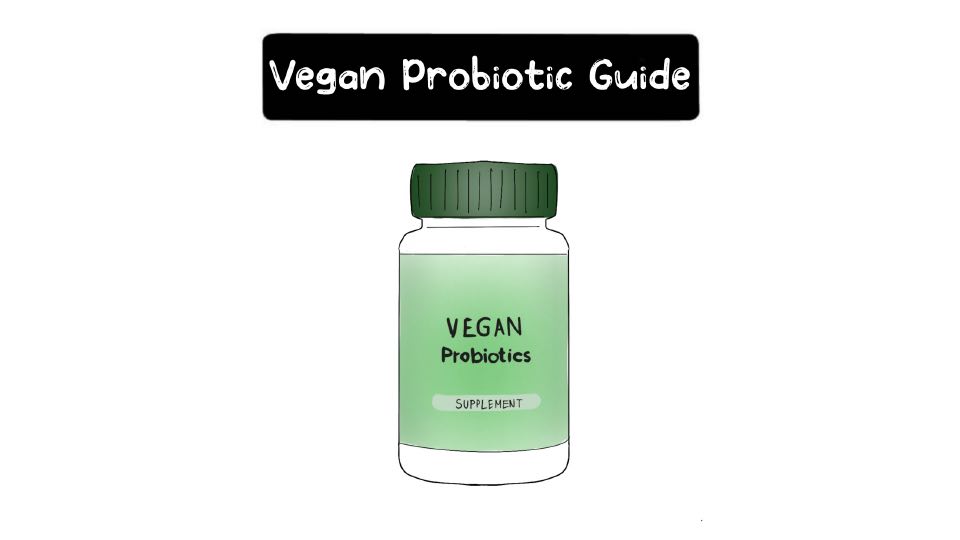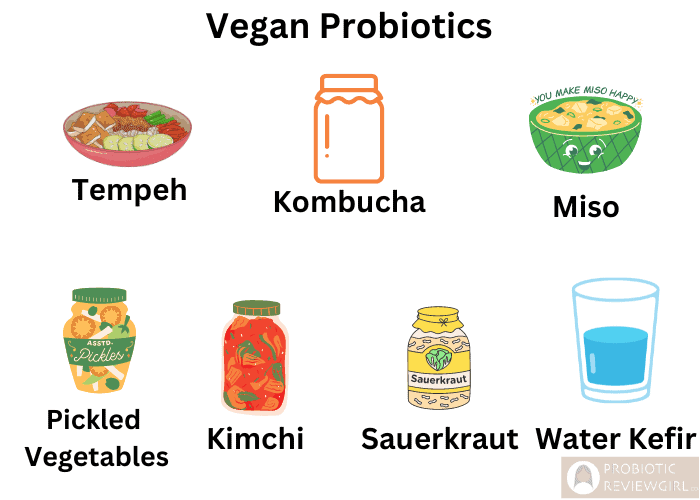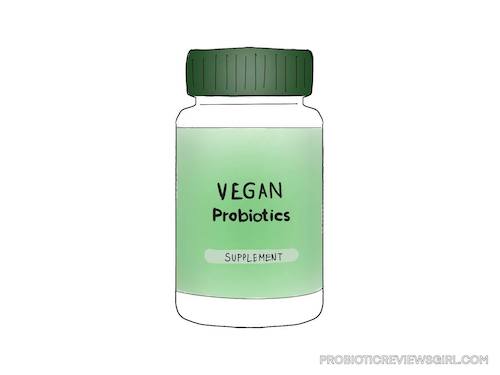Vegan Probiotics: Best Foods, Research And Benefits

Consuming non-dairy vegan probiotic foods, particularly those derived from raw plant materials, may offer unique advantages for gut health according to a 2022 study authored by K Küçükgöz.
Probiotics which are live microorganisms, that when consumed in adequate amounts, provide health benefits by improving the balance of beneficial bacteria in the digestive system and promoting overall gut health.
A vegan is a person who follows a lifestyle and diet that excludes all animal products and by-products, choosing to abstain from consuming any meat, dairy, eggs, or other animal-derived substances.
7 Best Vegan Probiotics

1. Kimchi
Kimchi can be vegan or not, depending on its preparation; traditional kimchi often includes fish sauce or shrimp paste, making it non-vegan, but vegan variations are made without these animal-derived ingredients.
Kimchi is a traditional Korean dish made from fermented vegetables, typically cabbage and radishes, seasoned with various spices and served as a side dish or condiment.
It can provide several health benefits. These benefits may include immune system regulation, weight loss support, anti-inflammatory properties, and potential anti-aging effects. Kimchi is considered safe for most people, except for those with specific allergies to its ingredients. It can promote good gut health due to its probiotic content and may also help prevent or manage certain health conditions.
Kimchi is a good source of vitamin C, an antioxidant that protects the body according to a 2021 study authored by A Korus. Making kimchi at home is also an option for those who enjoy cooking.
2. Sauerkraut
Sauerkraut can be vegan or not, depending on its ingredients and preparation. Traditional sauerkraut is typically vegan as it consists of fermented cabbage, salt, and sometimes other vegetables or spices. Some commercially available sauerkraut or homemade variations may include additional ingredients like fish sauce or other animal-derived products, making them non-vegan.
Sauerkraut is a fermented cabbage dish rich in probiotics, vitamins, and minerals, known for its potential health benefits and contribution to gut health. It contains probiotic bacteria that are beneficial for gut health, contributing to improved heart health, bone health, immune function, and reduced inflammation.
Sauerkraut is considered a low-calorie food and is rich in folate, vitamin B6, riboflavin, thiamin, and vitamin K. It is recognized as a superfood and is recommended as part of a healthy diet. Sauerkraut is a good source of fiber, promotes the growth of beneficial probiotics, and is high in antioxidants, particularly vitamin C according to a 2021 study authored by R Shahbazi.
3. Water Kefir
Water kefir is vegan because it is made from water, sugar, and kefir grains, containing no animal-derived ingredients, making it suitable for a vegan diet.
Water kefir is considered beneficial for health due to its probiotic content. Water kefir contains beneficial bacteria that support gut health and can contribute to improved digestion, weight management, blood regulation, and immunity according to a 2021 study authored by NF Azizi.
Water Kefir is a low-calorie beverage and is rich in nutrients, making it a good addition to a healthy diet. Water kefir is a low-sugar alternative and can provide antioxidant benefits according to a 2023 study authored by G Cufaoglu. Regular consumption of water kefir may boost the immune system and offer various health advantages according to medicinenet.
4. Pickled Vegetables
Pickled vegetables are generally vegan, as the pickling process involves fermentation or preservation in an acidic solution without the use of animal-derived ingredients.
Pickled vegetables are vegetables that have undergone fermentation or preservation in an acidic solution, often resulting in a tangy and flavorful product with potential probiotic benefits for gut health.
Pickled vegetables, specifically those fermented rather than vinegar-pickled, are considered good for your gut. Fermented pickles without vinegar are regarded as probiotic-rich, containing beneficial strains of bacteria that can contribute to a healthy gastrointestinal microbiome and aid digestion according to a 2020 study authored by SS Behera.
5. Tempeh
Tempeh is vegan because it is made solely from fermented soybeans, without any animal-derived ingredients, making it suitable for a vegan diet.
Tempeh is a fermented soybean product, rich in fiber and prebiotics, known for its potential health benefits, including promoting gut health and providing a good source of protein.
Tempeh is considered good for gut health due to its high fiber content and prebiotic properties. Tempeh is a fantastic source of fiber, promoting digestive health, keeping you full, maintaining healthy blood sugar levels, and reducing the risk of certain diseases according to Stephanie Tjasa Subandi from the University of Auckland.
Tempeh is also a fermented food that contributes beneficial bacteria for a healthy gut-brain connection and has been associated with cognitive benefits. Tempeh consumption has been linked to modulating gut microbiota and increasing beneficial bacteria like Bifidobacterium and A. muciniphila, further supporting gut health according to MyFoodResearch.
6. Miso
Miso is typically considered vegan because it is made from fermented soybeans, grains, or rice, and does not involve the use of animal products in its traditional preparation. Some commercial miso products may contain added ingredients, so it's essential to check the label to ensure it meets vegan standards.
Miso is a traditional Japanese fermented paste made from soybeans, rice, or barley, commonly used to add a rich and savory flavor to soups and other dishes.
Miso is considered good for gut health due to its probiotic properties. Miso contains beneficial bacteria that support a healthy gut microbiome, aid digestion, and reduce gastrointestinal issues such as gas, bloating, constipation, and diarrhea. Miso's fermentation process promotes the growth of probiotics, making it a nutritious and health-promoting food choice for digestive well-being.
7. Kombucha
Kombucha is generally considered vegan as it is made from tea, sugar, and a symbiotic culture of bacteria and yeast from SCOBY, without the use of animal-derived ingredients. Some varieties may include additional flavorings that could impact its vegan status, so it's essential to check the specific ingredients.
Kombucha is a fermented tea beverage containing probiotics and antioxidants that are believed to support gut health and overall well-being.
Kombucha is considered good for gut health due to its probiotic content and potential benefits for the gut microbiome according to a 2022 study authored by P Batista. Kombucha is also rich in antioxidants and probiotics, which can boost intestinal cell health, improve immune function, and aid in food digestion according to a 2023 study authored by S Selvaraj.
Many nutritionists believe kombucha may be beneficial to gut health due to its probiotics, but further research is needed to fully understand its effects. Regular consumption of kombucha is recommended in moderate amounts to support gut health and allow the body time to adapt to the probiotics. Some people may experience digestive upset or side effects from drinking too much kombucha.
Is A Vegan Diet Good For The Microbiome?
Yes, a vegan plant-based diet is good for the microbiome according to recent research.
A 2019 study authored by A Tomova, found that a plant-based diet, rich in fibers and polyphenols found in plant foods, promotes the development of a more diverse and stable gut microbiota. Vegans tend to have significantly higher counts of certain beneficial bacteria, such as Bacteroidetes-related operational taxonomic units, and increased levels of lactic acid bacteria.
The study suggests that these changes in gut microbiota composition contribute to anti-pathogenic and anti-inflammatory effects, cardiovascular protection, improved immunity against pathogens, and regulation of critical functions of the intestine through the production of short-chain fatty acids.
A 2021 study authored by EA Losno, found that a vegan diet was associated with an increase in the abundance of Bacteroidetes on the phylum level and a higher presence of Prevotella on the genus level in the gut microbiota composition.
Can Vegan Diet Cause Hair Loss?
A well-planned vegan diet that includes a variety of whole plant-based foods is not likely to cause hair loss.
Hair loss is the condition characterized by the loss of hair from the scalp or other parts of the body.
There are some cases where hair loss may occur on a vegan diet, but it is not directly caused by the diet itself. Hair loss can be due to various factors, including nutrient deficiencies such as protein, iron, or zinc, which can be managed by ensuring a balanced and nutrient-rich vegan diet according to a 2019 study authored by HM Almohanna.
Individual experiences may vary, and hair loss may have medical or lifestyle-related causes, rather than being solely attributed to a vegan diet. It is essential for vegans to be mindful of their nutrient intake and ensure they are meeting their nutritional needs through a well-rounded and diverse diet.
Can Vegan Diet Cause Acne?
A vegan diet may have the potential to cause acne or skin issues in some individuals according to a 2018 study authored by TJ Stewart.
Acne is a skin condition characterized by the presence of pimples, blackheads, and other blemishes on the skin, often occurring on the face, chest, and back.
Some potential reasons why acne may occur on a vegan diet include vitamin deficiencies, particularly low levels of B12 and zinc. A diet high in refined carbohydrates, such as pasta, sugar, bread, and white rice, can lead to higher serum glucose levels and increased sebum production, which can contribute to acne according to a 2019 study authored by A Pappas.
To address acne issues on a vegan diet, it is recommended to keep track of the foods you eat and observe how they impact your skin. Ensuring a well-balanced vegan diet that includes essential nutrients, such as B12, zinc, and vitamin A, may help prevent acne. If you experience persistent skin issues, consulting with a dietitian or dermatologist can provide personalized guidance and potential solutions.
Can Vegan Diet Cause Diarrhea?
Yes, some people experience diarrhea after going vegan is that this occurrence is relatively common and usually attributed to a sudden increase in fiber intake when transitioning to a plant-based diet.
Diarrhea is a condition characterized by the frequent passage of loose, watery stools, often accompanied by abdominal cramps and dehydration.
The body needs time to adjust to the higher fiber content, which can lead to loose stools. This adjustment period typically lasts for a week or two and should resolve on its own. It is best to reduce fiber intake initially and gradually increase it to ease the symptoms. Keeping a food journal and limiting certain foods like beans during the adjustment phase may also be helpful.
Can Vegan Diet Cause Diabetes?
A well-balanced vegan diet may actually reduce the risk of developing diabetes according to a 2017 study authored by M McMacken.
Diabetes is a chronic medical condition characterized by high blood glucose levels due to insufficient insulin production or ineffective use of insulin by the body.
Studies indicate that compared to individuals who consume more animal foods, vegetarians and vegans have a lower risk of developing diabetes. Adopting a plant-based diet can lead to decreases in blood sugar and blood pressure, especially if individuals are taking medications for these conditions.
Can Vegan Diet Cause Gout?
A plant-based vegan diet is not associated with an increased risk of gout according to a 2019 study authored by B Jakše.
Gout is a form of arthritis caused by the buildup of uric acid crystals in the joints, leading to sudden and severe joint pain, inflammation, and tenderness, often affecting the big toe.
While some plant foods may contain purines, which can contribute to gout, diets rich in plant foods have not been linked to gout or hyperuricemia. In fact, adopting a healthy plant-based diet can be beneficial for preventing gout and improving overall health. Plant foods are generally less concentrated in purines than meat and seafood, and the health benefits of a plant-based diet outweigh the potential risk of gout.
4 Benefits Of Probiotics

Probiotics can help with hair growth, acne, diabetes and gout according to research. Probiotics, including vegan probiotics offer numerous health benefits by promoting a balanced gut microbiome, improving digestion, boosting the immune system, and supporting overall well-being without the use of animal-derived ingredients.
1. Increasing Hair Growth
Probiotics found in Kimchi and Kefir have shown potential in helping with hair growth in Alopecia Areata. A 2020 study authored by DW Park revealed that probiotic supplementation through Kimchi and Cheonggukjang resulted in improved hair growth and reversal of hair loss in patients with alopecia.
Similarly, kefir, containing Lactobacillus probiotics, is believed to be beneficial for hair health due to its rich content of essential nutrients such as vitamin B7 (biotin) and other B-complex vitamins.
These probiotics may improve blood flow to the scalp and have positive effects on the immune system, contributing to healthier hair. Incorporating these probiotics into the diet may potentially aid in managing hair loss and promoting hair growth for individuals with Alopecia Areata.
2. Improving Acne
Probiotics have shown potential in being beneficial for acne treatment. Studies suggest that probiotics, both when taken orally and applied topically, may help reduce skin eruptions and improve skin hydration.
These live microorganisms have antibacterial properties that can potentially decrease the severity and count of acne. The gut-skin axis highlights the connection between gut health and skin conditions like acne, and an imbalance in the gut microbiome may contribute to acne development.
Probiotic strains such as Lactobacillus and Bifidobacterium have been found to be beneficial for acne management. They can help reduce inflammation, oxidative stress, rebalance gut dysbiosis, inhibit pathogenic bacteria on the skin, and maintain gut barrier integrity.
Lactobacillus plantarum CJLP55 isolated from Kimchi, a fermented probiotic food, has been linked to improved acne lesion count and skin hydration.
3. Improving Diabetes
The general consensus among experts is that diabetics can safely take probiotics and prebiotics. Probiotics have shown potential benefits for individuals with diabetes, such as lowering blood sugar levels and improving insulin sensitivity. Prebiotics, specifically Fructooligosaccharides, are also safe for diabetics, as they have no significant impact on blood sugar levels and can aid in blood sugar control and digestion.
Both probiotics and prebiotics can positively impact gut health and overall well-being in individuals with diabetes. Type 1 and Type 2 diabetics can safely consume probiotics, including probiotic-rich yogurt, which has shown benefits for blood glucose levels and inflammatory markers in type 2 diabetes.
4. Improving Gout
Probiotics, particularly the strain Lactobacillus salivarius CECT 30632, have shown potential in reducing the number of gout episodes. These beneficial bacteria can degrade purines in the blood and help protect against kidney damage, which is relevant to managing gout. Gout is a painful form of arthritis that commonly affects the big toe.
Lactobacillus probiotics are commonly found in supplements and fermented foods and are known for promoting gut health and balance. Incorporating these probiotics into one's diet may offer benefits in managing gout and reducing its symptoms.
Dr. Sara Mesilhy has a Master’s degree in Gastroenterology and holds a membership with the Royal College of Physicians of the United Kingdom. She completed her Bachelor of Medicine, Bachelor of Surgery (MBBS) at Cairo University and is currently part of the ProbioticReviewGirl medical team.
Hi. I’m glad to have found the probioticreviewgirl.com website, I
really like it! I’m going to share it with my friends.
Thanks so much for the guide. Really thank you! Really Great.
I am so grateful for this guide. Thanks Again, Alicia!! Really Cool.